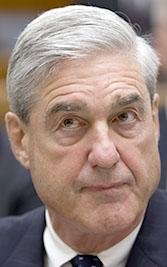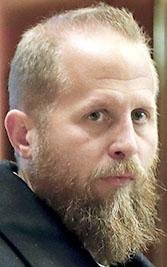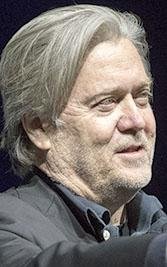WASHINGTON -- Special counsel Robert Mueller is scrutinizing the connections between President Donald Trump's campaign and the data-mining firm Cambridge Analytica, which has come under criticism over reports that it swiped the data of more than 50 million Facebook users to sway elections.
Mueller's investigators have asked former campaign officials about the Trump campaign's data operations, particularly about how it collected and utilized voter data in battleground states, according to a person with direct knowledge of the line of inquiry but not authorized to discuss it publicly.
The investigators have also asked some of Trump's data team, which included analysts at the Republican National Committee, about its relationship with Cambridge Analytica, according to two former campaign officials. The campaign paid the firm just under $6 million for its work in 2016, according to federal records.
Authorities in Britain and the United States are investigating whether Cambridge Analytica may have used data improperly obtained from Facebook to try to influence elections, including the 2016 White House race.
Mueller is leading a criminal inquiry into whether Trump's Republican presidential campaign had ties to Russia and whether Trump obstructed justice.
The Trump campaign has distanced itself from the data-mining firm, which had been financed by Republican donors and, for a time, employed Steve Bannon, the conservative provocateur who later became Trump's campaign chief executive.
Trump turned to Twitter on Thursday to boast about his campaign's social media efforts compared with those of his Democratic opponent, Hillary Clinton, but it was not clear what prompted the declaration.
"Remember when they were saying, during the campaign, that Donald Trump is giving great speeches and drawing big crowds, but he is spending much less money and not using social media as well as Crooked Hillary's large and highly sophisticated staff. Well, not saying that anymore!" Trump wrote.
A request for an explanation from the White House was not returned.
The House Energy and Commerce Committee meanwhile formally requested that Facebook Chief Executive Officer Mark Zuckerberg testify at a coming hearing in response to the reports concerning Cambridge Analytica's apparent misuse of user data.
"The latest revelations regarding Facebook's use and security of user data raises many serious consumer protection concerns," said Republican Rep. Greg Walden of Oregon, the panel's chairman, and Rep. Frank Pallone Jr. of New Jersey, the committee's top Democrat.
"After committee staff received a briefing yesterday from Facebook officials, we felt that many questions were left unanswered."
Lawmakers have demanded answers from Cambridge Analytica and Facebook, as Sen. Mark Warner, the Virginia Democrat who is vice chairman of the Senate Intelligence Committee, declared this week that the blooming scandal is "more evidence that the online political advertising market is essentially the Wild West."
"Whether it's allowing Russians to purchase political ads, or extensive micro-targeting based on ill-gotten user data, it's clear that, left unregulated, this market will continue to be prone to deception and lacking in transparency," Warner tweeted.
Zuckerberg on Wednesday apologized for a "major breach of trust," admitted mistakes and outlined steps to protect users.
He and Facebook's No. 2 executive, Sheryl Sandberg, had been quiet since news broke last Friday of Cambridge Analytica's data grab.
ROLE MURKY
The exact role that Cambridge Analytica played in the Trump campaign has remained murky.
[PRESIDENT TRUMP: Timeline, appointments, executive orders + guide to actions in first year]
Cambridge Analytica staff members made several overtures to the Trump campaign before eventually being retained. They first requested a meeting in the spring of 2015, before the celebrity businessman officially announced his candidacy, according to four former campaign officials who were not authorized to publicly discuss internal operations and spoke on condition of anonymity.
Alexander Nix, the Cambridge Analytica chief executive officer captured on a sting video released this week, met with then-campaign manager Corey Lewandowski to make a pitch for the data-mining company's voter target products, including its so-called psychographic method.
Lewandowski passed, in part because the staff believed Trump would not be willing to make a sizable financial investment in an analytics firm, according to two of the campaign officials.
Cambridge Analytica then went to work for the campaign of Trump's Republican rivals Ben Carson and Ted Cruz. But after Trump became the GOP's presumptive nominee, the data firm reached out again, this time to Paul Manafort, who had replaced Lewandowski to become campaign chairman.
Manafort was also skeptical about the effectiveness of the firm's methods, but Cambridge Analytica was hired, in part as a friendly gesture to the Mercer family, heavyweight Republican donors who helped fund the company's launch a few years earlier, according to one of the former campaign officials.
With the Trump campaign concerned that the Republican National Committee might not fully invest in Trump -- he had clashed repeatedly with the organization -- Cambridge Analytica was retained. Campaign finance records indicate that the Trump campaign's first payment of $100,000 to the firm came in July 2016.
Five of the firm's staff members were assigned to work with the campaign's digital director, Brad Parscale, at his Texas-based firm, where much of the campaign's digital operation was located.
Parscale and Jared Kushner, the candidate's son-in-law, emphasized using social media -- and particularly Facebook -- to better target voters and pressed its importance on Trump.
The campaign tapped Cambridge Analytica to build out a database of small-dollar GOP donors, a data set the company had from its previous work for the Cruz and Carson campaigns.
But when it became clear that the Republican National Committee would share its much-improved data operation with the Trump campaign, Cambridge Analytica became de-emphasized. Two of the former campaign officials said their tools were not useful, though Parscale, during a Google forum a month after the election, said the firm became involved in daily tracking polls and helped inform the campaign's decisions on where to spend its resources.
Another of the campaign officials said Cambridge Analytica was kept around mostly to placate the Mercers and their allies on Trump's staff.
All told, the Trump campaign paid Cambridge Analytica just under $6 million, according to Federal Election Commission records. The largest payment to Cambridge Analytica -- $5 million on Sept. 1, 2016 -- was made about two weeks after Bannon was appointed the chief executive of the Trump campaign, according to FEC records. At that same time, another Mercer ally, pollster Kellyanne Conway, was named Trump's campaign manager to replace Manafort.
Bannon, with the Mercers' backing, served as vice president of the firm from June 2014 to August 2016, when he joined the Trump campaign. He has since had a falling out with the Mercers and with Trump over disparaging comments he made about the president's family.
On Thursday, he attempted to draw a line between the campaign and Cambridge Analytica while appearing at a Financial Times panel in New York. Bannon said he had no knowledge of the data-mining operation and instead put the blame on Facebook, saying the social network cared more about profits than privacy and "takes your data for free and creates huge margins."
Chris Wylie, a former Cambridge Analytica employee who became a whistleblower, told The Washington Post that Cambridge Analytica had begun testing phrases like "drain the swamp" and "deep state" well before Trump launched his campaign. The president began incorporating those concepts into his stump speech in the stretch run of the campaign, soon after Bannon came on board.
Wylie has said he fears the data were turned over to Russians who aimed to interfere with the U.S. election.
Parscale, who has been appointed Trump's 2020 campaign manager, has slammed the firm on Twitter for taking credit for Trump's victory.
"So incredibly false and ridiculous," he wrote this week, declaring Cambridge Analytica's comments "an overblown sales pitch."
The news of Mueller's interest in Cambridge Analytica was first reported by ABC News.
Information for this article was contributed by Jonathan Lemire, Barbara Ortutay, Mae Anderson, Danica Kirka, Gregory Katz and Michael Liedtke of The Associated Press; and by Tony Romm of The Washington Post.
A Section on 03/23/2018




